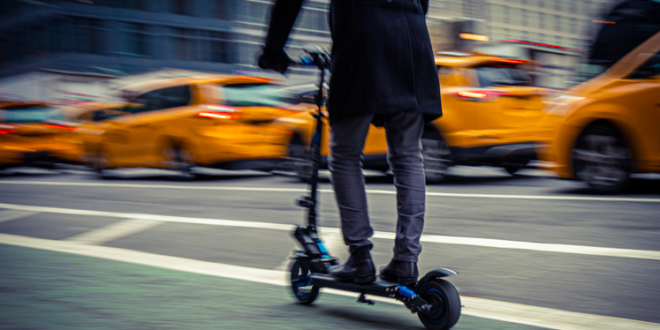By Dominic O’Connor, Senior Associate at international intellectual property firm, Marks & Clerk
In the UK you can’t use your own e-scooter on the road, but a Government trial could soon change that. Central to the success of the trial will be whether safety concerns with scooters can be overcome, but there is evidence of competition driving innovation in the marketplace which is already leading to safety improvements.
It’s becoming more likely that you’ll see someone out on an e-scooter and judging by their increasingly widespread use and conceptual similarities to electric bikes, you may be forgiven for thinking that they can be freely ridden on roads, but this, is not the case.
Under current rules, the default position is that privately-owned e-scooters cannot be used on roads, because most of them don’t have rear red lights, indicator lights and number plates. Besides this e-scooters are, at present, classified as “motor vehicles”, which means for road use they would need to be insured and taxed, among other things, which is difficult in practice.

Currently, you can’t use your own e-scooter in public areas (including roads), instead only on private land, but the UK Government is conducting e-scooter trials to help decide whether a change in rules is needed. The trials are for rental e-scooters only and are limited to certain geographic areas.
The biggest stumbling block to a successful trial as things stand appears to be scooters’ perceived lack of safety. However, it is important to recognise the role that competition plays in driving innovation – and the way in which scooter patents (by protecting the investment companies make in innovation) may lead to safety improvements. Much as innovation in cars led to airbags and seatbelts making cars much safer than in the past. It may now lead to a parallel improvement in scooter standards such that if and when private ownership is indeed legal, it will be a much less dangerous proposition.
We are already seeing evidence of improvements in safety standards from innovation by scooter manufacturers who are clearly taking these concerns seriously. Much of this innovation, particularly from the hire part of the market, is in the way the scooter analyses the data it has collected, which is then used to control how the scooter operates. For example, “computer vision technology” from Swedish micromobility start-up Voi uses cameras to detect when there are lots of pedestrians around and slows the scooter down. The system can also detect the surface on which the scooter is travelling e.g. a bike lane (legal) or pavement (illegal), and can adjust speed accordingly.
Geofencing, which shuts down the scooter when it leaves an unauthorised zone, is becoming more sophisticated, with hire-company, Lime, operating a system which takes effect in less than a second, thanks to storage of data on the scooter which is instantly accessible.
Another rental company operating in the UK, LINK, is experimenting with a “Pedestrian Defence” system. The system senses unsafe behaviours like aggressive swerving and repeated hard braking, as well as pavement and wrong-way riding, taking steps to correct or slow the scooter. The system collects data in a similar way to a car telematics system that insurance companies use to monitor driving but takes it a step further by controlling the behaviour of the vehicle (scooter) based on the monitored data.
Many of these innovations are aimed at preventing the scooter being used illegally, but what about when the scooter is being ridden within the rules of the road? For many, innovation is needed to improve safety here too. Scooters for some people have always faced an uphill struggle to prove their safety in comparison to bikes, because of their inherent differences in design. Firstly, scooters have smaller wheels than bikes, which makes it more difficult to ride over obstacles comfortably, or at all. In addition, scooter riders travel in the standing position rather than the sitting position which tends to make the rider less stable and more likely to topple off in a collision.
Of course, innovation in braking systems will be important to increase the chances of the scooter stopping before a collision occurs, but powerful brakes come with their own challenges, and technology is needed to apply the brakes in a way that avoids throwing the rider off the scooter during braking.
Helmets are another area where research is still needed – a study by Imperial College London suggests that head impact from falls from scooters might be different to those from bikes, and it is safe to say that more research will be needed in this area.
Judging by advances being seen in driverless car technology, it seems likely that as scooters become more sophisticated, they will be able to sense obstacles ahead and take evasive action, whether it be pedestrians, potholes or other road users.
The ban on public use of privately-owned scooters has not stopped e-scooter manufacturers from intense marketing of e-scooters to consumers in the UK, with a wide choice available and typical prices ranging from around £100 to around £1000. Big-name manufacturers are involved, like Lamborghini and Segway. No doubt much of the investment from manufacturers is driven by the looser rules that other countries have on e-scooter use on roads, notably the US and much of Europe.
The outcome of the government’s trial will be crucial, and it can be seen that many of the hire companies involved in the trial are moving in the right direction and taking steps to address safety concerns. The trial was originally expected to run until summer 2022, but reportedly is now being extended to November 2022, after which a decision on whether to legalise use of privately-owned scooters on roads is expected.
Read more: Dott sees 85% increase in new riders so far in 2022
If the decision is to open the roads to e-scooters, sales could really take off. With their light weight and small folded-down size, e-scooters have the edge over electric bikes for portability and convenience, and, in time, safety concerns may be mitigated with the help of innovation.
 micromobilitybiz Delivering news updates to the micromobility industry, focusing on e-bikes, e-scooters and green transport
micromobilitybiz Delivering news updates to the micromobility industry, focusing on e-bikes, e-scooters and green transport




